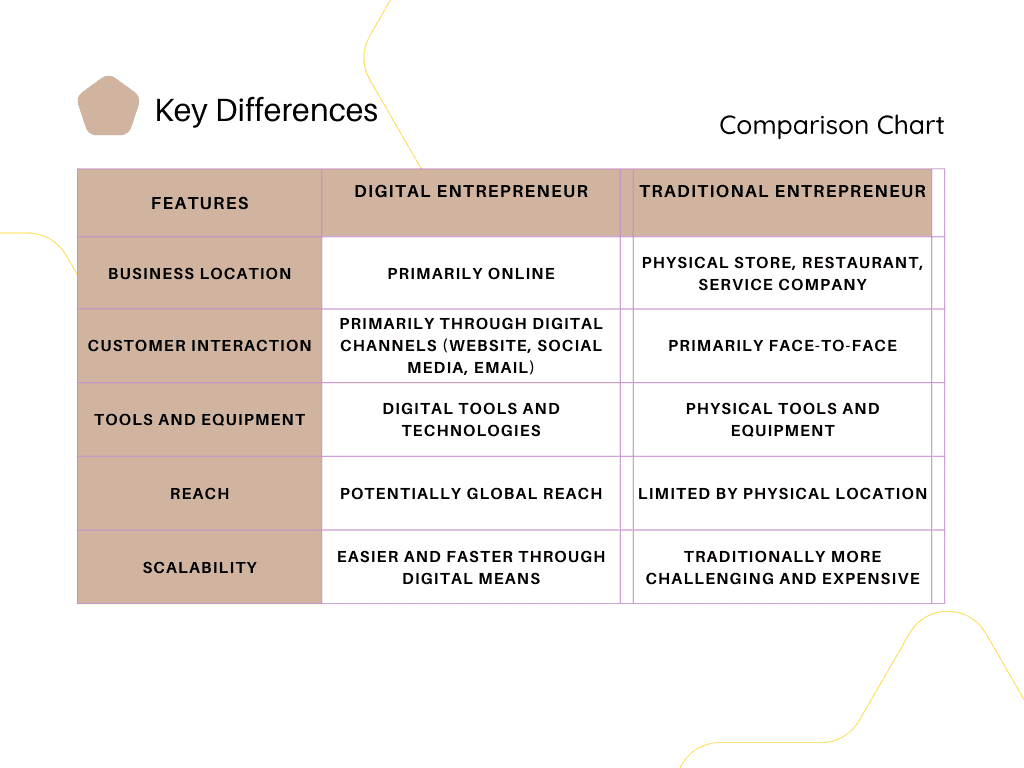This page may contain affiliate links. Please read my disclosure for more information.
Did you know that almost 30% of all business is conducted online, and that number is growing? Being a digital entrepreneur can be a very rewarding career path, both financially and in terms of flexibility and creativity. Whether through e-commerce, digital marketing, content creation, a blog business, or software services, there are many ways to succeed in online business.
What is a Digital Entrepreneur?

In today’s digital age, a new breed of entrepreneur has emerged: the digital entrepreneur. Unlike their traditional counterparts, who establish and operate brick-and-mortar businesses, digital entrepreneurs operate entirely or primarily online. A digital entrepreneur’s business is built on the foundation of the internet. It utilizes digital tools and technologies every step of the way, from establishing their presence in online courses to reaching customers and delivering their products or services.
Digital Entrepreneurship vs. Traditional Entrepreneurship

Traditional entrepreneurs focus on setting up and managing physical businesses, such as stores, restaurants, or service-related companies, where customer interactions mostly happen face-to-face. They use physical tools and equipment for daily operations, with some digital aids like point-of-sale systems. On the other hand, digital entrepreneurs center their efforts on creating and operating online businesses, engaging with customers primarily through digital channels like websites, social media accounts, and email. They rely extensively on various digital tools and technologies, including website and e-commerce platforms, content management systems, and digital marketing tools.

While traditional entrepreneurs are often bound by the geographical location of their own business, limiting their reach and making scalability a costly and challenging endeavor, digital entrepreneurs enjoy the advantage of potentially global reach and easier scalability. This is because they are digital entrepreneurs who can expand their customer base and scale operations through digital means rather than physical expansion. Examples include e-commerce store owners, bloggers, online course creators, and social media influencers, who can tap into a worldwide audience and grow their own businesses without the significant expenses associated with opening new physical locations.
Why Become a Digital Entrepreneur?

Compared to traditional entrepreneurship, digital entrepreneurship offers many benefits that can be highly appealing to individuals seeking flexibility, freedom, and the potential for growth. Some of the key reasons why you might consider becoming a digital entrepreneur are:
1. Flexibility and Freedom
Being a digital entrepreneur means you are your own boss. You have the freedom to set your own hours, choose your work environment, and manage your schedule according to your preferences. This allows for a better work-life balance and the ability to structure your work around your personal commitments.
Unlike traditional businesses tied to a physical location, the digital world allows you to work from virtually anywhere with an internet connection. This opens up possibilities for remote work, travel, and location independence. Whether you’re a digital nomad exploring the world or simply want the flexibility to work from home, your office becomes wherever you choose.
2. Lower Startup Costs
Compared to setting up a traditional brick-and-mortar business, launching an online business often requires significantly lower startup costs. You save money and eliminate expenses like rent, utilities, furniture, and physical inventory, allowing you to start small and scale up gradually. This can be particularly appealing for aspiring entrepreneurs who may not have access to significant initial funding.
Operating an online business venture minimizes the ongoing overhead associated costs with running a business owner’s physical space. You may not need to pay for full-time employees, utilities for a large space, or expensive equipment, making your business model potentially more lean and cost-effective.
3. Global Reach
The internet allows you to reach a global audiencethat wouldn’t be possible with a local physical business. You can connect with potential customers from anywhere in the world, significantly expanding your market reach, online sales, and potential customer base.
Digital businesses can overcome traditional barriers to entry faced by local businesses. In the online world, You can compete with established companies in other locations and offer your products or services to a wider demographic, regardless of their physical location.
4. Scalability
Scaling a traditional business often requires significant investments in additional physical locations and resources. In the digital world, however, scaling is often easier and faster. You can easily add more products or services to your online store, expand your marketing reach, and adapt to growing demand without the limitations of physical space.
With the ability to reach a global audience and leverage digital tools for automation and marketing, digital businesses have the potential for faster and more exponential growth compared to traditional businesses.
These are just a few examples of why aspiring entrepreneurs are increasingly drawn to the digital world. If you’re looking for flexibility, freedom, and the potential to build a successful business with lower upfront costs and a wider reach, then digital entrepreneurship might be the perfect path for you.
Digital Entrepreneur’s Skills For Success

Building a successful digital business requires a unique set of skills and resources. Just like any entrepreneur, you need a strong foundation and the right tools to succeed. Let’s explore the essential elements of the digital entrepreneur:
1. Choosing a profitable niche market
Conducting thorough market research can help you identify a profitable niche market with high demand and lower competition. This allows you to focus on serving a specific audience and become an expert in your field.
2. Digital Skills
Setting up a website, developing a digital marketing plan, leveraging social media platforms to connect with your target audience, building brand awareness, conducting content marketing campaigns, and promoting your online business through social media marketing strategies are essential skills for a digital entrepreneur.
3. Technical Skills
Even if you plan to hire virtual assistants, understanding the basics of digital technologies, web development, website hosting, SEO (Search Engine Optimization), and analytics tools can help optimize your online presence and ensure your website and content are easily discoverable by your target audience.
4. Business Management Skills
Effective financial planning, project management, networking, customer experience, and relationship management skills are crucial for running and scaling your digital business. This includes budgeting, forecasting, and managing online transactions securely.
5. Resilience and Perseverance
Finally, building a business online requires resilience and perseverance. The journey can include setbacks and failures, but the ability to persevere, learn from mistakes, and keep moving forward is key to long-term success.
By acquiring the essential skills, building a solid digital foundation, and continuously expanding your knowledge, you can equip yourself with the necessary tools to thrive as a digital entrepreneur.
How to Start a Digital Business

Every successful venture begins with a good business idea; the digital world is no exception. However, translating that idea into a thriving digital business world often requires careful planning and execution. Let’s delve into the initial stages of your digital entrepreneurial journey:
1. Developing a Business Idea
Launching your digital venture requires a solid business idea that blends your passion, skills, and market research. Brainstorm by exploring your interests, skills, and potential problems you can solve. Research current trends and market gaps to identify your niche. Remember, validate your idea with thorough research – talk to potential customers, analyze competitors, and assess market demand to ensure its viability.
2. Crafting a Business Plan
Once you have a validated online business idea, it’s time to create a roadmap for your venture. Your business plan serves as a blueprint outlining your goals, strategies, and financial projections. Clearly articulate your short-term and long-term goals. What do you want to achieve with your business? Be specific and measurable. Check out my business plan template.
3. Secure Funding
Depending on your business model, you may need to secure funding to get your venture off the ground. You can start your own online business or venture by bootstrapping. This involves financing your business using your savings, personal income, or credit cards. It allows you to maintain full ownership and avoid debt but may limit your initial growth potential.
If you need a larger amount of capital, consider seeking investors, such as angel investors, venture capitalists, or crowdfunding platforms. This can provide access to significant funding but often comes with giving up some equity or control over your business.
Business Ideas For Digital Entrepreneurs

The digital landscape is ripe with opportunities for entrepreneurs looking to start a new business venture. Here are several business ideas tailored for digital entrepreneurs, tapping into various interests, skills, and market demands:
- E-commerce Store – Specialize in niche products, from sustainable goods to hobbyist supplies. The key is to find a niche with high demand but low competition to stand out in the market. Use Shopify to easily set up your online store, manage inventory, and handle payments securely.
- Digital Marketing Agency – Offer services in SEO, social media marketing, email marketing, content creation, and pay-per-click advertising. Businesses are always looking for experts to enhance their online presence. Easily set up your digital marketing agency on Go High Level’s all-in-one website, sales, and marketing platform.
- Online Education and Courses – With expertise in a particular field, you can monetize your skills, create and sell online courses, or conduct webinars. The demand for online learning platforms is growing across various subjects and skills. Teachable allows you to create one course, coaching, or digital downloads for free.
- App Development – Develop mobile apps for businesses or your own innovative app idea. With the increasing reliance on smartphones, the app market continues to expand.
- Content Creation – Start a blog, YouTube channel, or podcast in a niche you’re passionate about. Monetize your content through network ads, sponsorships, and merchandise.
- Subscription Box Service – Curate and deliver subscription boxes in niches like gourmet foods, beauty products, books, or pet toys. Personalization and uniqueness are key.
- Freelance Services – Offer your skills as a freelancer in writing, graphic design, web development, or virtual assistance. Platforms like Fiverr and Upwork can help you find clients.
- Social Media Consulting – If you have a knack for building followers and engagement, you can offer consulting services to businesses looking to improve their social media strategy.
- Affiliate Marketing – Create content to promote products and earn commissions for each sale made through your referral. Niche websites and blogs are perfect platforms for affiliate marketing. You can even sign up for the Amazon Affiliate Program without a website.
- SEO Consultant – Help businesses improve their search engine rankings and online visibility. This requires a deep understanding of SEO best practices and algorithms.
- Digital Product Sales – Sell digital products like ebooks, photography, MMR products, digital art, software, or music. This has low overhead and can be distributed globally.
The digital landscape is filled with inspiring stories of individuals who have turned their ideas into thriving businesses. Check out my Self Made Series of digital entrepreneurs and their success stories.
Conclusion

Your path to becoming a digital entrepreneur begins with an idea. Don’t be afraid to experiment, learn from challenges, and embrace the ever-evolving digital space. Remember, success won’t happen overnight, but with dedication and persistence, you can turn your digital dream into a reality. To empower your journey, explore these valuable resources:
- Best all-in-one website, sales and marketing tool: Go High Level
- Best ecommerce website platform: Shopify
- Best email marketing software: ConvertKit
- I Want to Start a Business But Have No Ideas
- How to Start an Online Store
FAQ: Digital Entrepreneurship
Q1: What are the first steps to becoming a digital entrepreneur?
A1: The first steps involve identifying a market need or niche you’re passionate about, conducting thorough market research to validate your idea, and then creating a detailed business plan. Additionally, acquiring the necessary digital skills and understanding the basics of setting up an online business, such as a website and social media profiles, are crucial early steps.
Q2: How much does it cost to start a digital business?
A2: The cost can vary widely depending on the type of digital business. Some online business ventures, like content creation or affiliate marketing, can start with very low initial investments, primarily requiring your time and effort. E-commerce or app development may require more significant upfront costs for product development, inventory, or software. However, in general, traditional and digital entrepreneurs and businesses tend to have lower startup costs compared to traditional businesses due to the lack of physical premises and related expenses.
Q3: Can I run a digital business while working a full-time job?
A3: Yes, many digital entrepreneurs start their ventures as side projects while maintaining full-time employment. The flexibility and scalability of digital businesses make them suitable to be developed part-time. Effective time management and prioritization are key to balancing both commitments successfully.
Q4: How do I know if my digital business idea is viable?
A4: To assess the viability of your business idea, conduct market research to understand your target audience, demand for the product or service, and the competitive landscape. Validating your idea can involve:
- Surveys.
- Interviews with potential customers.
- Testing the concept with a minimum viable product (MVP) to gather feedback and gauge interest.
Q5: How much can a digital entrepreneur expect to earn?
A5: The salary of a digital entrepreneur varies widely based on the business type, scale, and strategy. Incomes can range from modest amounts for new businesses to significant earnings for well-established online businesses. Success and higher earnings typically develop over time through growth, adaptation, and consistent effort.







+ show Comments
- Hide Comments
add a comment